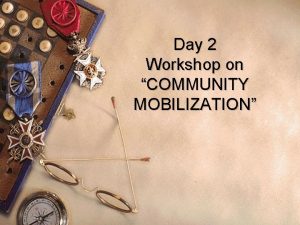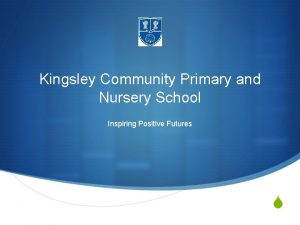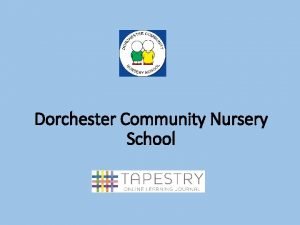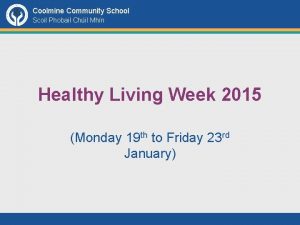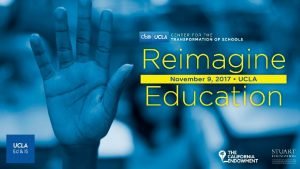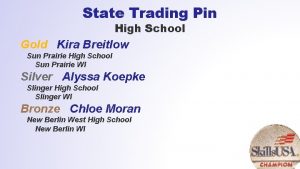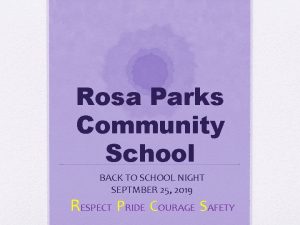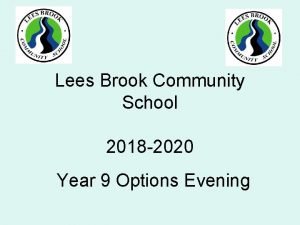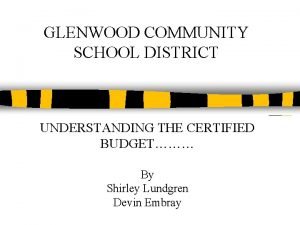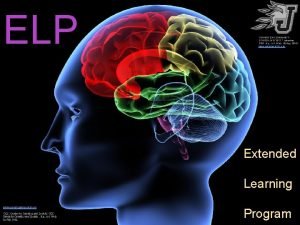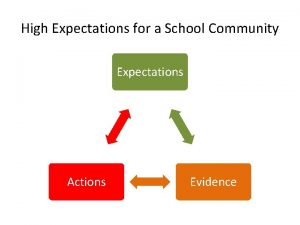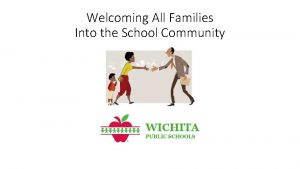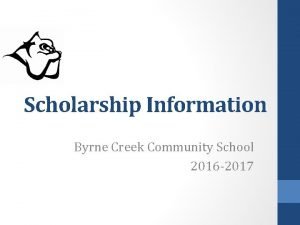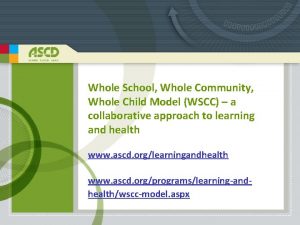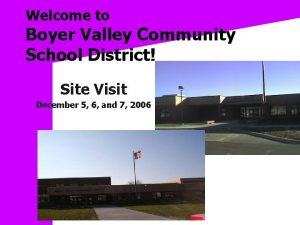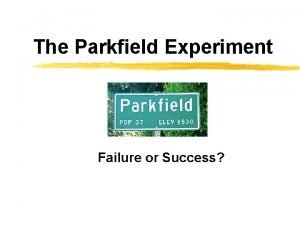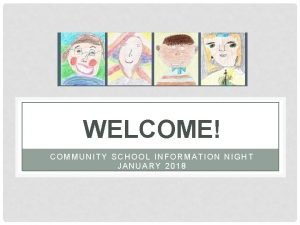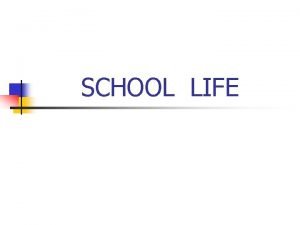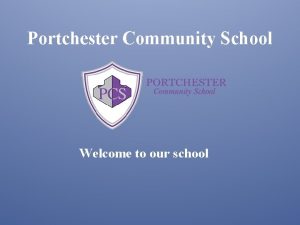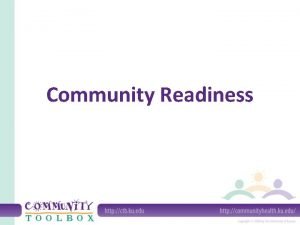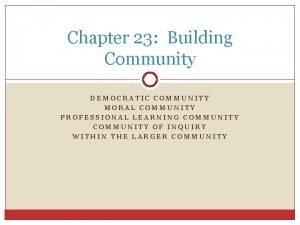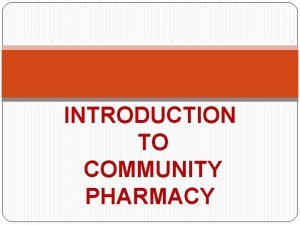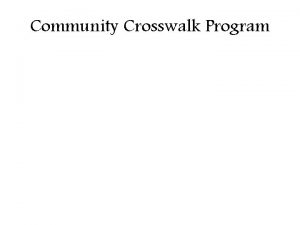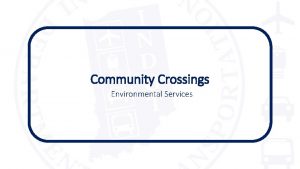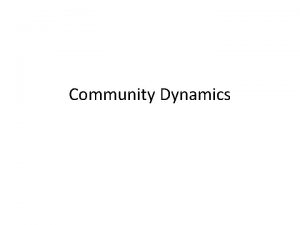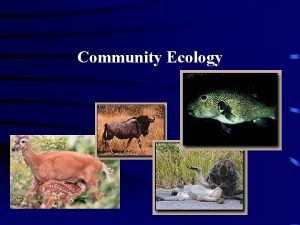Welcome to Parkfield Community School Welcome WELCOME TO





















- Slides: 21

Welcome to Parkfield Community School

Welcome WELCOME TO Nursery! Beginning school is a major event in the life of a four year old and it won’t be long before your child will be starting with us at Parkfield Community School. There will be lots of new things to learn and of course you will want to ensure that you child is well prepared for this important event. We aim to make it a happy and memorable experience. We hope that this booklet will provide some useful information that will help your child to settle quickly into school.

Contact details Parkfield Community School, Parkfield Road, Saltley, Birmingham, B 8 3 AX Telephone: 0121 – 464 - 1131 Email: enquiry@parkfield. excelsiormat. org School Website: www. parkfield. excelsiormat. org Head Teacher: Mr J Wright Deputy Head Teacher: Mrs A Schofield

Meet the Staff Mrs E Lloyd Lily Class Teacher EYFS Lead Mrs K O`Brien Class Teacher Mrs F Malik Teaching Assistant

Parents as Partners We recognise the importance of parents and carers in a child’s developing stages. As a primary care provider, you are your child’s first educators and we greatly value any input, opinions and information you can share with us about your child’s learning and progress. To support this, we produce a ‘Learning Journey’ on Tapestry within the classroom that records your child’s learning and achievements during the school day. These represent both child-initiated activities and directed tasks. We also encourage you to contribute to these by making small observations at home. (For example if your child’s target is to identify numbers to 10, you may notice him or her using the remote control to change the channel correctly to channel 3. This is showing us that your child can recognise the number three independently. ) By providing us with your email address, you can add observations on to Tapestry and support us in the development of their Learning Journey. Please complete the attached form and return it to school. We provide many other opportunities for parents and carers to take an active part in their child’s education. These include: • Parent’s evenings • Sports Day • Termly newsletters • Parent workshops Most importantly, our family ethos is central to our school and as such, we operate an `Open-Door Policy’ where parents are actively encouraged to meet with staff to discuss any concerns at the earliest opportunity. Our staff are available at 8. 30 am and 3. 20 pm to answer any questions.

Preparing your child for school As your child will now be part of a class, they will need to become more independent. It will make starting school much easier and happier if they are able to do as many things as possible for themselves. What should he/she be able to do? Can he/she… • Dress and undress themselves? • Put on and fasten their own coat? • Use the toilet independently and ask to go there? • Tidy up after himself/herself? • Recognise their own name? . • Feed himself/herself? • Share toys and equipment? • Hold a pencil correctly? • Sing some nursery rhymes? • Listen well and follow simple instructions? How can I help my child prepare for school? • Encourage your child to be as independent as possible even if it takes far longer for them to get ready. • Establish sensible bedtime routines which get your child ready for sleep, eg sharing a bedtime story • Allowing time in the morning to make sure your child arrives promptly and is ready to learn • Never threaten them with school! Be positive. • Support us by reinforcing the importance of regular attendance.

What can I do with my child before they start school? • Give your child as many varied experiences as possible: drawing, painting, cooking, singing, making models, playing games, jigsaws, etc • Get them used to: pencils, crayons, felt pens, chalks, paints, play dough, scissors • Share stories, books and rhymes. Read to them. • Count everything and share things out. • Use lots of everyday counting opportunities —cup, plate, knife, for and spoon for each person. • Talk to them all of the time. Name familiar things and discuss what they see around them and what things are for. Talk about what you see when you are out and about. Watch people work and discuss what they are doing.

The School Day AM session 8: 30 am - Doors open 8. 40 am - Doors close. Carpet play. Registration PM Sessions 11: 45 Doors open Carpet play registration. Door closes at 12 pm 12: 00 pm Singing / story 8. 45 am - English group time 12: 30 pm English group time 9: 00 - Free flow activities including outdoor play 12: 45 pm - Free flow activities including outdoor play 9: 45 am – Maths group time 1: 45 pm – Maths group time 10 am - Free flow activities including outdoor play 2 pm - Free flow activities including outdoor play 10: 50 am – Phonics group time 2: 45 pm - Phonics group time 11: 00 Story time 3: 00 pm Story time 11: 20/30 Home time 3: 20 pm Home time

The School Day (continued) Morning Procedure Collecting your child The children will enter at the side of the school office and walk through the red gate to reach the Nursery door. At 8. 30 am/11. 45 am the doors will be opened by a member of staff and your child will make their way inside. Once in the classroom they will be asked to place their book bags into their named drawer, hang up their coat, self-register and then access the toys that will be located on the carpet. Doors will be closed at 8. 45 am/12. 00 pm. At the end of the session you are able to access the playground from 11. 20 am/3. 20 pm. The children will remain in the classroom until a member of staff has seen their parent. The children will then be called. It is vital that you inform us if someone different is collecting your child. If we are unsure, they will remain at school until we can contact you. Under 16’s are not permitted to collect children under 7 years old.

Water and Fruit The children have access to a piece of fresh fruit and water throughout their session so there is no need to provide them with snacks. Milk At the end of their Nursery session, each child will receive a free carton of milk to take home.

General Information Attendance Please arrive on time for school at 8. 30 am/11. 45 am so your child does not miss the start of lessons. If your child is late please take them to the front office so they can be registered for the session. Lateness is recorded and can have an impact on your child’s learning. If your child is not attending Nursery for medical reasons, please telephone the school office on 0121 -464 -1131 no later than 8. 30 am and inform us of the reason for their absence each day. Illness If your child is ill during the Nursery session, then they will need to be collected as soon as possible. Please make sure the office have all the telephone numbers necessary to contact you at either work or home. Please keep your child off school if they are unwell. In the case of sickness, your child should remain at home for at least 24 hours after the last episode of vomiting. In the case of diarrhoea, children should not come to school until 48 after the last occurrence. Medical appointments It is helpful to know in advance about any medical appointments. Please request an appointment card when making your child’s appointment which can be shown to the staff in the office. Appointment letters can also be shown. Medicines Unfortunately staff are unable to administer medicines in school. If you need to give medicine during the session, parents are asked to come to the school office, and they will ring the classroom for your child so you can give the medicine. Staff will administer inhalers and epi-pens if required. Asthma For children with asthma, please provide the school with a clearly labelled inhaler stating your child’s name and dosage. If a spacer is required, it is the parents’ responsibility to provide this.

Parent Consent Forms We will ask you to complete a form at the start of the year giving us consent for local trips, visitors, photographs and videos. If you do not wish your child’s photograph to be used for the school website or other forms of media, please let the school know. Please note any photographs and videos are only used within school, on the school website and Twitter. Visits and visitors are subsidised by the school, but parents are asked to contribute towards the overall cost. We ask each of our Nursery parents to contribute £ 10. 00 via Parent. Pay. If you do not already have a Parent. Pay account, then you will be issued with a login and password in September. During the school year your child will have the opportunity to work with a professional artist, visit a farm, have a visit from the Animal Man, take part in a session with a professional storyteller and work with representatives from the RSPB.

Learning in the Foundation Stage Nursery is where the excitement begins! Foundation stage children learn together in an environment which is developed around the children’s interests. We pride ourselves on being an exciting and engaging place to be - encouraging our children to be independent learners through a range of practical activities. We follow a thematic curriculum which allows us to be creative with our lessons and let the children lead their own learning. As our Nursery children enter the classroom they learn primarily through a variety of play and real-life experiences. Our teaching is delivered through carefully planned activities and whole class sessions. The children access their environment freely and staff provide scaffolds and extend their learning. Their development is tracked through detailed, daily observations and child-initiated interaction. This information is then transferred into your child's personal learning journey on Tapestry. We use these to record individual interests, progress and plan the next steps of your child's learning.

The EYFS Curriculum In reception our Foundation Stage children follow the Early Years Foundation Stage Framework (EYFS). This curriculum is based upon four themes and principles. The Unique Child - We understand that every child is an individual child who is capable in their own right. The holistic child has a variety of needs that need meeting over their time in the Foundation Stage. Positive Relationships - Social interaction is key to children’s development. Children become strong, independent learners; as well as scaffolding their learning through positive social interaction. Enabling Environments - Providing a safe, secure and stimulating base for your children is key to their development. The framework allows for experiences that respond to the child’s individual needs/ interests; as well as developing a strong partnership between practitioners, parents and carers. Learning and Development - Children develop and learn in different ways. The framework covers the education and care of all children in early years provision, including children with special educational needs and disabilities.

Early Learning Goals Within `Development Matters’ there are 3 prime areas of learning and 4 specific areas. This framework provides the basis of how we structure the setting, the activities and opportunities we provide; as well as how we assess your child’s development. For each of these areas your child will have an ‘Early Learning Goal’ to work towards. Prime Areas • Communication and language • Personal, social and emotional development • Physical development Specific Areas • Literacy • Mathematics • Understanding the world • Expressive arts and design Characteristics of Effective Learning • Playing and exploring • Active learning • Creating and thinking critically

Marvin`s Marvellous Mountain At Parkfield Community School we teach the children how to write letters using a precursive script. We follow a scheme called Marvin`s Marvellous Mountain which introduces the children to a character called Marvin the Monkey. As we learn each letter, the children are introduced to Marvin`s friends and rhymes to support correct formation.

School Uniform Our school uniform consists of a red sweatshirt, jumper or cardigan and white polo T-shirt. Footwear must be black shoes not trainers. Skirts and trousers must be grey. To help your child to be independent it is better to choose shoes with a Velcro fastening rather than laces. Girls shoes should fasten and not have a high heel for safety reasons. Girls also have the option of wearing a red gingham dress in summer. It is essential that you label ALL of your child’s clothing. All jumpers and sweatshirts look the same and you have a much better chance of your child coming home with their belongings if they are clearly labelled. Try to remember this throughout the school year too, when purchasing new items. As our learning environment are both indoors and outdoors, we ask that you make sure your child is equipped for these areas at all times of the year. Please ensure their clothing is practical and suitable for the seasonal changes. Waterproof jackets, wellies and winter clothing for cold and wet weather; sun hat and protective clothing in the summer months. We ask that sun cream is applied before the children get to school so that they are ready for the day.

Things to bring to School • • Suitable coats—nothing too special as it is likely to get sandy, muddy or wet. Hats, scarves and gloves during the winter months. Sun hats during the summer months Book bags for their supplementary reading book, letters and homework.

Helping Prepare your Child for School Here at Parkfield Community School we go to great lengths to help your child be prepared for their next stage of learning; as well as developing the confidence and skills to be an independent learner. In preparation for school, here are some things you can do with your child to help them develop the basic skills on the road towards their Early Learning Goals. Speaking • Speak clearly and confidently • Model using the right words and set an example • Speak in full sentences • Use clear, simple directions for tasks and behaviours • Engage in discussions with your child and allow them the time to speak without being interrupted • Ask for their opinions • Tell them about your day and ask about theirs. Listening • Show your child how to be a good listener by listening to them and others • Be patient—don’t interrupt or finish their sentences for them • Give them your full attention when they are speaking, showing them eye contact and good body language. • Respond to what they are saying by asking questions or ask about their opinions. • Listen to your child reading. Number Skills • Count daily with your child • Count objects, actions, numbers and a range of things. • Identify numbers wherever you go—a neighbours house number or the number on a bus. • Help children putting numbers in order. • Let children help with the tidy- ing and sorting. Can they sort the DVDs by colour? • Identify shapes around the home. �Use fingers to represent a number.

Writing • • Encourage your child to mark make without feeling pressured. Get your children colourful pens, gel pens and exciting new tools to encourage them to mark make. Let children write their name on cards or letters. If your child is already writing with a pen or pencil, support their pencil grip so they do not develop a bad habit. Extending their learning • • • • • Agree clear and realistic rules—and stick to them. Give your child boundaries so they know what is expected of them. Encourage your child to always say ‘please’ and ‘thank you’. Support the school rules. If your child’s behaviour is proving difficult, we can work on a home/school reward system together. Children like routine—so set regular times for bed, getting up, meals and family time. Under 5’s need a good night’s sleep to help them to learn. Check your child has their name in every- thing before they bring it, this helps them be organised themselves at school. Help your child remember to bring every- thing—book bag, reading book etc. Help your child to have all the equipment they need for learning. Let your child take hold of their own things on the way to school—they will know where to put their coat and book bag. Link your child’s learning to family activities. Go to local museums, parks, wildlife reserves and into nature. Talk about the world around them and encourage them to ask questions. Get to know what your child is learning—we will send home a newsletter each term for you to read. Take time to listen to your child and explain things carefully, developing their understanding and vocabulary. Let your children help you at home with the cooking, cleaning and shopping—they relish an opportunity to feel useful! Be patient when your child is helping. Lay your child’s clothes out in the correct order each morning so they can dress themselves. Children are expected to toilet themselves once they begin Reception.

Holidays Autumn Term 2020 Term Starts: Tuesday 1 September 2020 Start dates and induction process to be confirmed via Tapestry and website Half Term: Monday 26 October 2020 to Friday 30 October 2020 Term Ends: Friday 18 December 2020 Spring Term 2021 Term Starts: Monday 4 January 2021 Half Term: Monday 15 February 2021 to Friday 19 February 2021 Term Ends: Thursday 1 April 2021 Summer Term 2021 Term Starts: Monday 19 April 2021 Half Term: Monday 31 May 2021 to Friday 4 June 2021 Term Ends: Wednesday 21 July 2021
 Community action cycle
Community action cycle Wise men three clever are we
Wise men three clever are we Naas community national school
Naas community national school Kingsley community primary school
Kingsley community primary school Dorchester community nursery
Dorchester community nursery Coolmine community school
Coolmine community school Functions of community
Functions of community Give two piece of advice to avoid computer addiction
Give two piece of advice to avoid computer addiction Welcome performance in school
Welcome performance in school Josh duhm
Josh duhm Rosa parks community school
Rosa parks community school Lees brook community school
Lees brook community school Glenwood community school district
Glenwood community school district Deans community high school
Deans community high school Johnstoncsd
Johnstoncsd Coolmine community school
Coolmine community school Community expectations examples
Community expectations examples Welcoming all families into the school community
Welcoming all families into the school community Byrne creek community school
Byrne creek community school Miramar community school
Miramar community school Whole school whole community whole child model
Whole school whole community whole child model Boyer valley jmc
Boyer valley jmc
